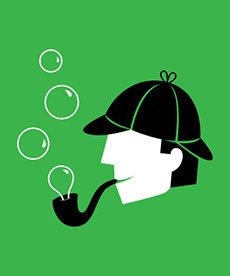CLEVELAND -- "Baskerville," at the Allen Theatre in Cleveland's Playhouse Square, is a rarity in modern theater: an action-adventure play. Once a staple of staged productions over the centuries, live action murder and mayhem largely disappeared as movies and their realistic special effects eclipsed stagecraft in the 20th century.
In the Playhouse production (which runs through February 12th), forty roles are inhabited by three of the arguably hardest-working-actors in North America. Throughout the show, they shift from character to character, climbing in and out of a dizzying array of Velcroed/tear-away costumes, while superb actors, Raphael Untalan and Jacob James, remain in character as Holmes and Watson, respectively.
The staging and rapid-fire timing of the Ken Ludwig farce are courtesy of director, Brandon Fox, who clearly had fun with the cast and the many opportunities for invention along the way.
The three all-purpose players, Evan Alexander Smith, Brian Owen and Nisi Sturgis, play the comic relief duos, the bad guy, the red herrings, the befuddled constables, the love interests - and even push around a considerable amount of furniture and rocky outcroppings over the course of the masterful and extremely entertaining performance.
For the audience, watching the sheer stamina and versatility of the players is both astonishing and exhilarating.
The current media triage goes this way: movies are for action and adventure, TV is for dialogue, genre pieces and comedy, and the stage is for spectacle, musicals and one person tour-de-force productions. However, that wasn't always the case.
For much of modern history, the stage or parlor plays were the go-to entertainment form for action, sword fights, canon fire, shipboard intrigue, slapstick comedy and the full gamut of human activities.
In the middle of the 20th century, as movies began to feature elaborate car-chases, dystopian cityscapes and anything else the human mind could imagine, theater became more of a place for thoughtful dialogue and serious explorations of culture and ideas - things that did not lend themselves to the big screen. And of course there were always, and will always be, musicals.
By the 1990s, thoughtful dialogue and serious topics increasingly migrated to television, as marketing and distribution costs made original dramas and "small" movies too financially risky.
More recently, with the ever-expanding number of niche channels including Netflix and Amazon, the small screen has become a hotbed for new explorations of ideas, character and culture, leaving live theater with a less clear position in the spectrum of entertainment options.
Productions like "Baskerville" remind us that even though live theatre has become less relevant for many Americans who have no habit of going to plays, there are many ways in which the live experience is wholly different more powerful than the screen experience.
Perhaps it is because we are wired to respond viscerally to real human beings who inhabit the same space with us. Or perhaps it is way we can experience the formidable craft of the performers, who cannot hide behind second takes, editing, or CGI processing.
In any case, it's safe to say -- regardless of advancements in immersive digital experiences, or virtual reality gradually blurring the distinction between stage and screen -- there will always be a special thrill when humans gather in a room together and watch players strut and fret upon the boards.